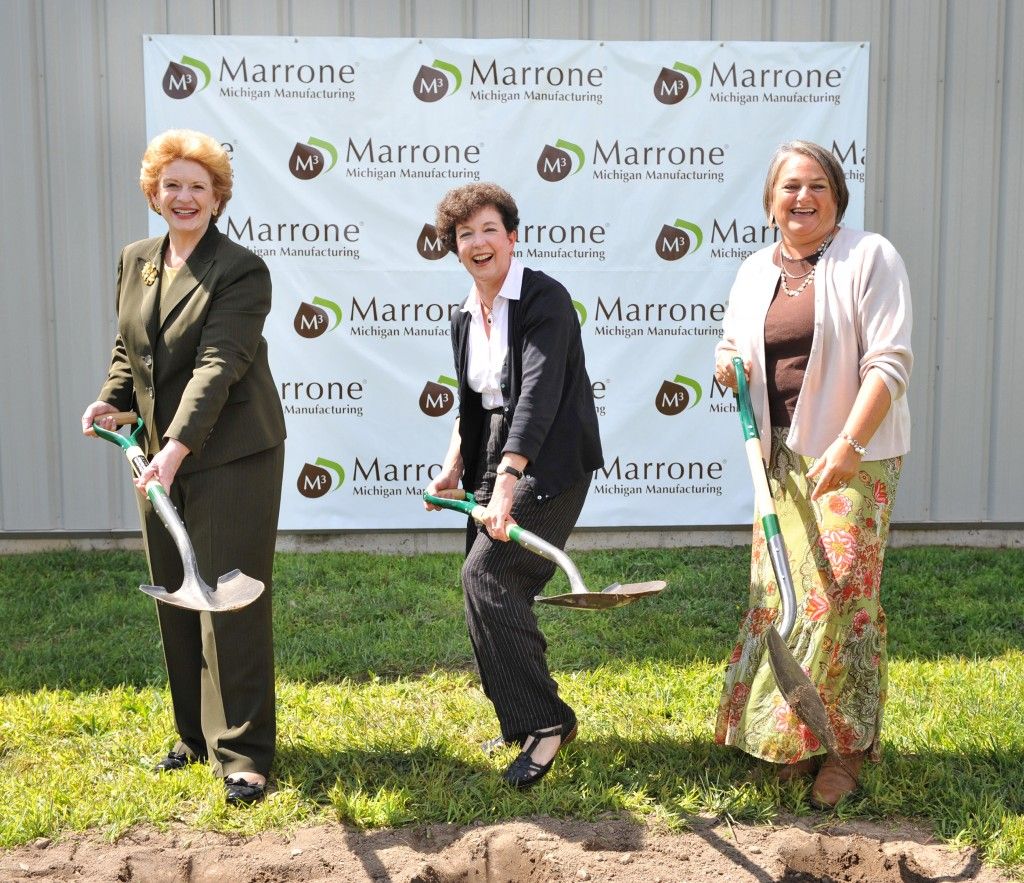Today is International Women’s Day, a day designed to celebrate the social, economic, cultural, and political achievements of women while also recognizing that there is still substantial progress to be made in the standing of women globally.
When it comes to agriculture, the industry remains largely male-dominated. The 2012 Census of Agriculture concluded that of the 2.1 million farms in the US, only 288,264 had women as principal operators; that’s a mere 13.6 percent. Over the past 40 years, this figure has remained relatively static.
The tech industry is also home to similar gender disparities. Last year, HuffPost Tech reported that only 26 percent of computing jobs are staffed by women. It also noted that the number of women in tech had actually declined since 1992.
For Sara Allen, technology development manager for crop protection engagement at Monsanto, one of the main challenges for women working in agriculture is communication.
“A lot of the time women think differently about things, approach them differently, and don’t communicate them in the most effective way for men,” said Allen, who has set up a women’s’ group within her department. “Of course, it depends on the atmosphere you’re in to be able to communicate with authority and knowledge. Some women don’t want to be treated differently and instead want to be one of the guys. But I feel there’s a need for role models, and to show women that it’s ok to be female in a male organization and that they’re bringing something different to the table.”
There are some indications that things are changing in agriculture and agtech, however, such as the increasing number of female entrepreneurs that presented at last year’s Ag Innovation Showcase.Salinas-based agtech startup HeavyConnect, which provides cloud-based software for farm management, reports that 75 percent of its employees are women and some states have even launched educational initiatives to help female farmers learn about farming technologies. Initiatives like Monsanto’s GROW (Growing Relationships and Opportunities for Women) are also positive.
With this is mind, AgFunderNews caught up with three female agtech entrepreneurs to find out more about their experiences of working in the rapidly growing agtech sector; if and how being a woman impacted them; and where they see the agtech sector going in the coming years.
Pam Marrone knew she wanted to be an entomologist at the age of seven when she penned a letter to the USDA and the agency responded by sending her some grainy black and white pamphlets about integrated pest management. She went on to work at several high profile agribusinesses including Monsanto where she was given a free reign to help the company develop a biotech program. It was here that she developed technologies used to combat corn rootworm and that were integral to developing “Bt corn”, Monsanto’s genetically modified strain of corn. After Monsanto, Marrone founded AgraQuest, a company offering natural products for pest management, which was acquired by Bayer CropScience in July 2012 for $450 million. Eventually, Marrone went on to found Marrone Bio, a company providing bio-based pest management products.
Kelly Smith’s journey to agtech started in the laboratory when she was hired to work as a fermentation engineer at an agtech-related startup. Smith landed the gig based on her experience in fermentation even though she didn’t know anything about agriculture. Now, Smith serves as the director of microbial development at AgBiome, a biotech company using plant-associated microbiome technology to create ag products. The company has created what it touts as the largest collection of fully sequenced and annotated microbes from the crop microbiome.
Agrilyst founder and CEO Allison Kopf found her way to the agtech world in a roundabout fashion. In college, she worked on a project that involved raising one million dollars to build a solar powered home. She fell in love with the energy industry and soon joined indoor agriculture startup Bright Farms during its early years. Kopf went on to found Agrilyst, a data intelligence platform for indoor farms that recently won first place at TechCrunch’s Disrupt SF 2015 challenge.
Is it challenging being a female CEO working in agtech and alongside the venture capital community?
Marrone: Because there were so few women at Monsanto, I found that I stood out. I got a lot of attention when I was at Monsanto. I had all these mentors, coaches, and sponsors who wanted to make sure they were promoting women. I almost lost control of my career through so many people telling me what I should be doing. Now, I think I stand out as one of a few female CEOs in agtech. When I started up AgraQuest, it wasn’t so much being female that was an issue, it was having a Ph.D. They wanted me to be the chief science officer and didn’t think I had the business chops for another role.
The biggest problem women have, and I have it too, is that there is a different set of behaviors that are acceptable for women. If Hillary Clinton started yelling like Donald Trump, she would be gone in a heartbeat. You have to be very careful as a woman, and I have had to constantly check my style. If you raise your voice or get highly animated, your people will never forget that whereas a guy can bang his fist on the table and be celebrated for being strong. There’s a double standard. No question.
Smith: Most of my experiences have been good. I have been fortunate in that I have not had to deal with some of the things that I hear happen like venture capitalists hitting on female entrepreneurs. There’s been a little bit of that but, for the most part, the fact that I have specialized technical experience has led people to see me as a technical expert first. There’s still a bit of a “boy’s club” in the ag chemicals industry, but it’s mostly nostalgia at this point. The folks I deal with now are extremely professional.
Kopf: I think it’s challenging to be a founder no matter what. Women certainly face challenges when starting companies; I think it’s difficult for any person, in general, to start a business. It’s challenging to raise money right now. It’s also hard to feel like you have security when you are bootstrapping for a given amount of time. All of those pressures of starting a company are challenging. I don’t know that I’ve felt any challenges that make being a woman stand out. We have great investors, advisors, supporters, and a good community around us that are helping us build this company.
How would you characterize working in the agtech sector compared to other sector’s you’ve come across and how has it changed?
Marrone: There is very little overt bias, but there is still a lot of subconscious bias. I am on the board of the Association of Women in Science, a group that advocates for increasing opportunities for women in STEM. I have many fellow board members from life sciences, government, pharma, and medical devices. Based on what they say, it could be worse in other industries. Academia might be the worst, where it can be less merit-based than companies.
Smith: I think being seen as a technical expert really helps; I haven’t perceived a lot of overt sexism. That has been true in the agtech sector as much as any other I have worked in. With that said, the other sectors I worked in before ag I could definitely perceive a glass ceiling at work and that was one of the reasons I became an entrepreneur because I felt my chances of moving up the ranks in the companies I previously worked for were pretty slim.
Kopf: I think the agtech space is interesting. The majority of farmers generally in most areas of farming are male. The tech industry is heavily male dominated, but some components to the agtech space are female dominated. I think most cannabis farmers are women,. There’s certainly still room for women to grow in the space and there are certain strengths that women have that lend themselves to agtech. Regardless of gender, it’s important that people in the agtech space building technology for farmers really understand the problem that they are solving and the person who they are solving it for. That is more of a challenge than who is doing the problem solving.
What other challenges do you face working in agtech?
Marrone: There are always challenges being CEO and a leader. The biggest challenges are hiring and associating with the people who share your values and vision. You’d think the challenges are technical ones, but they pale in comparison to the difficulty getting the right people on the bus and having them all aligned. I have been discriminated against based on salary and have been paid less than a man in the same position with a similar background. I absolutely make sure we do not have that issue. Women don’t ask for as much upfront.
Smith: I suppose there’s still pressure to be always on top of things. Plus there is still a perception that women are humorless, or cannot take a joke, or are emotional and liable to cry. People sometimes make an exaggerated effort to watch their language around ladies and it’s irritating because it distracts from the business at hand. It brings awareness to gender when they should be focused on the work. I don’t imagine that’s different in any other industry.
Kopf: The dynamics of the agriculture industry have changed and grown in ways that don’t compare to other industries. We now have data being used, which is changing how farmers interact with their farms, but it is still leaps and bounds behind the technological world. Now you have drones in the field, and people are starting to do things with artificial intelligence and machine learning. The data space is just catching up with other industries, which is great, but it also presents challenges for farmers who don’t have experience interacting with AI or complex data algorithms. Some farmers may not even want to do those things, which also presents challenges.
What advice would you give to female entrepreneurs?
Marrone: If I had to do it all over again, I think I would have gone for an MBA. I think getting that upfront, or at some point, would have really helped on the money raising front. Now, it’s a moot point. I’ve got business experience by taking every business course at Monsanto and Novus — my second job — thereby earning the equivalent of an MBA. The other piece of advice involves culture, vision, and values. It is really important to start the company knowing what you have in mind and what kind of culture you want to build. It’s so hard being an entrepreneur if you don’t have the people on the bus who share that. Keeping the culture you want as the company grows in scale is really challenging for any CEO so starting from Day 1, it’s key to reinforce your mission, vision, and values throughout the hiring process.
Smith: I would say be very clear about your goals and how being an entrepreneur is going to affect your home and family life. You need a very supportive partner who is going to understand that you will need to travel a lot, work long hours, and be willing to support you while you do that. I regularly meet women who find it difficult to balance responsibilities and what they need to do to make companies successful. Make sure your eyes are open.
Kopf: Do it. Just go for it. One of the biggest things that has been helpful for me was to build a really strong support network of people who understand what I am going through. Just talking to other founders who have gone through financing rounds, or failures of companies, or who have gone on to make successful companies after failures. Having people to call when times get tough is important. If we are hiring, for example, the first thing I do is I reach out to everyone in my network.
What changes or challenges do you see facing agtech in the coming years?
Marrone: Commodity prices and consolidations are big. The whole ag sector is depressed right now because farm incomes are really low. That is challenging for anyone providing services and inputs to farms. But this is just a phase and long-term drivers of increasing population growth and a need for sustainability are all there. I think the sky’s the limit for agtech. Another challenge is that with so many people entering the sector there will be more competition. It’s kind of the Wild Wild West right now and time will tell which companies will shake out and which will rise to the top. We are going to focus on ramping up existing products, bringing a few more to market, and expanding internationally.
Smith: I think the sector has a lot of opportunity facing it with consolidation among the majors. That will create opportunities for startups to get technology developed and to be innovators in their sectors while the majors are distracted by M&A activity. Entrepreneurs should take advantage of that so you can outlast the M&A turmoil and be ready with the technology that the majors will want when the dust settles. That is exactly where we hope to be, and that is our plan. We raised our Series B last year, and those funds will be used to push the technology further down the pipeline so we have the technology ready for the industry. The flipside to the M&A frenzy and consolidation is that it will be difficult to get deals done with those companies for the next few years. They won’t have attention to focus on doing deals or research so that will be challenging if your business model is based on those avenues. If you have the dream and the ambition, I say go for it because there is no time like the present, and none of these challenges should be enough to stop a bright, ambitious woman from getting on in this industry. It’s an exciting time.
Kopf: We’ve got macro challenges facing the globe. Everyone is on the same page that we can’t feed 9 billion people with our current resources and that it will require innovation across every different subsector. There is a tremendously exciting opportunity for the industry to address and face these challenges. You’ve also got this gap in technology, and it will jump because there is a lot of investment happening. It’s really exciting because the space is developing fast but with fast technology development, you have to really understand deployment and your end user. If the companies fail to understand farmers and produce inputs that work specifically for farmers, the space will suffer because adoption of technology will end up decreasing.
Have news or tips? Email [email protected]
Image: Senator Debbie Stabenow, Marrone Bio Innovations CEO Pam Marrone, and Bangor Mayor Jennifer Carpio-Zeller, courtesy The Davis Enterprise





